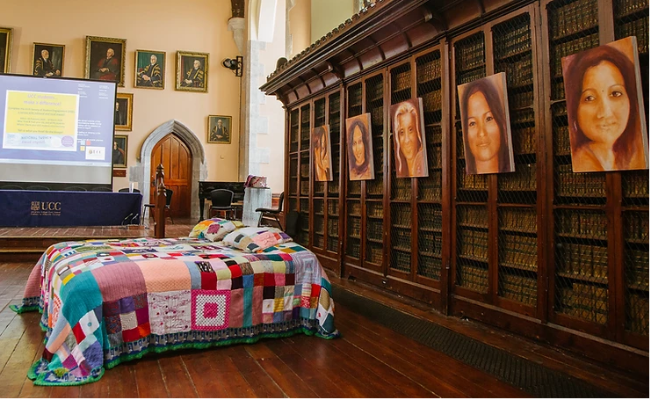In This Section
- Home
- MA in Women's Studies
- PhD in Women's Studies
- Teaching and Supervision Team
- History of Women's Studies at UCC
- Research and Events
- Conference Archive
- (09/10 -06-2017) Women's Voices in Ireland
- (02 -03-2017) Women's History Month Herstory Salon
- (19-06-2016) BodyStories Conference
- (04-09-2015) Performance, Politics, Protest
- (13-06-2017) Women and Austerity Conference Saturday 13th June
- (13-09-2017) Women and the media: feminist concerns
- (06-03-2014) Preventing and combating violence against women and domestic violence
- (01-03-2017) Paying the price to the uttermost farthing? Women and World War
- (15-06-2017) Irish Feminist Activism and the Arts
- (15-06-2012) Women in Politics: from Quotas to Representation
- (25-02-2012) From X to A B C: 20 Years On
- (18-09-2010) Moving in from the Margins
- (09-05-2009) Irish Feminisms and the Future
- (24-05-2008) Exploring Mothers: Discourses, Representations, Practices
- (09-06-2009) Mothering in Contemporary Ireland
- (17-06-2006) Buying Sex is not a Sport
- (27-05-2006) Irish Feminist Futures Postgraduate Conference
- (21-05-2005) If I knew then what I know now
- (12-03-2025) PG7044 International Women's Day Event: Jumping Generations - Revisited
- Graduate and Postgraduate Research
- Staff Research
- Conference Archive
- Graduate Opportunities
- MA students' blog posts
- Relevant Links
- Contact Us
The work of the Elephant Collective and the contradictions of the HSE - Doris Murphy

Doris addresses the work of the Elephant Collective, and also reflects on her experience as a former HSE worker
Today I learnt about the Elephant Collective, a national volunteer organisation campaigning for mandatory inquests for all maternal deaths. In preparation for our guest lecture from Martina Hynan, I read two chapters from Untangling the Maternity Crisis (2019) a book edited by Jo Murphy-Lawless, the founder of the Elephant Collective. Jo is a Sociology lecturer in NUIG, and in the fifth chapter of the book, she recounts how her interaction with midwifery students precipitated the establishment of the Elephant Collective. These students were distraught by the recent death of Bimbo Onanuga, a pregnant Nigerian asylum-seeker. While none of them had been involved directly with this woman’s care (or lack thereof), they all felt that there was a certain institutional atmosphere that allowed this to happen. The hospital were very quick to absolve themselves from any responsibility in Bimbo’s death, but Jo describes how the students were weighed down by the realisation that we would be working in a broken system, where person-centred care is a phrase bandied about, but rarely acted upon. “Theirs was the weight of an ethical sensibility … which could not be eclipsed despite the determinism of schedules, of protocols and regulations, of all the machinery of our contemporary way of doing things, which seeks to normalise what cannot and should not be made normal”. I felt this phrase in my bones. The feelings of helplessness and hopelessness that it evoked brought me straight back to my time working for the HSE.
I did not work in an acute setting where people could die due to my decisions, however I too had felt the impotence of working for an institution that focuses on the throughput of clients, rather than the care of people. I worked extremely hard to make my clinic room a positive, non-judgemental, person-centred space, and I reaped the benefits of this by building beautiful relationships with the smallies under my care, and their extended families. I loved them, though this was a sentiment that was considered extremely abnormal. I was honoured to gain the trust of these little people, who at their young ages had already faced many challenges. Their carers felt comfortable enough to express their frustrations to me. We discussed the loneliness of raising a child with a disability. Moreover, they expressed the absurdity of the Irish system, where they had to fight tooth and nail with state services, whose only role is to care for people with disabilities. I took my role as an advocate seriously, and would contact other professionals and services to further their cause. At every turn, I was met by stock comments about waiting lists, staff shortages, lack of funding, prioritisation guidelines, and more often than not, shrugged shoulders and people refusing to take responsibility for their own service. I would report back to the parents, frustrated by my lack of progress. They were dejected, and already hopeless in the face of the insurmountable challenge of accessing services to which their child was entitled. I left the HSE eventually, as I was drained by the institution. The aforementioned quote chimed with me, as I could not accept excuses about our broken system. It’s inspiring to see this group turning this realisation into a positive action, which will hopefully bring legislative change. I still can’t shake the feeling that this reactive approach will never bring the institutional overhaul that is required, where state services would actually place people at the centre of their services.
Addendum: The legislation was enacted on the 10th July 2019, thanks to the hard work of the Elephant Collective.
Image: the exhibition organized by the Elephant Collective in UCC Aula Maxima, 27-28 March 2018
